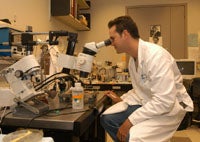Toxic Oxygen at Root of Common Diseases

Posted in GUMC Stories
 Most people think that hypertension, or high blood pressure, is a disease centered on the heart, which is the vital pump. That makes sense because hypertension is often linked to heart attacks and early death from heart failure.
Most people think that hypertension, or high blood pressure, is a disease centered on the heart, which is the vital pump. That makes sense because hypertension is often linked to heart attacks and early death from heart failure.
But Christopher Wilcox, MD, PhD, considers this to be too simple an explanation. His theory has long been that blood pressure is ultimately linked to unbalanced kidney function, which can then lead to cardiovascular disease.
He was among the first to put the connection together decades ago – which is now, he says, quite widely accepted by physicians and investigators. “I got interested in high blood pressure because I felt convinced that it was primarily a kidney problem and, at that time, few people really believed that,” says Wilcox, Chief of the Division of Nephrology and Hypertension at Georgetown University Medical Center.
“My research suggested to me that the blood pressure ultimately was dependent upon the fullness of the circulation which was under the control of the kidneys,” he says. Wilcox also realized that the two main things that cause high blood pressure – high salt intake and the hormone angiotensin – both act through the kidneys.
 Now his focus is to find the root of this all-too-common condition – and Wilcox is again proposing a novel theory. He believes that kidney dysfunction is caused by oxidative stress – an imbalance in the use of oxygen in cells that leads to the production of toxic oxygen molecules that change kidney function so as to make it retain salt and water – and that high blood pressure and vascular disease result from this imbalance.
Now his focus is to find the root of this all-too-common condition – and Wilcox is again proposing a novel theory. He believes that kidney dysfunction is caused by oxidative stress – an imbalance in the use of oxygen in cells that leads to the production of toxic oxygen molecules that change kidney function so as to make it retain salt and water – and that high blood pressure and vascular disease result from this imbalance.
And he is working to establish a unique multidisciplinary center at Georgetown around this fundamental hypothesis. Human clinical studies designed to test the theory are already underway and a candidate agent called tempol that is designed to correct oxidative stress has already been shown to work well in animals.
This integrated, holistic approach to understanding and treating oxidative stress could potentially offer substantial clinical benefit, Wilcox says. More than half of the adult population in this country has hypertension. Some degree of chronic kidney disease affects one in ten U.S. adults. Moreover, 50 percent of all U.S. deaths are from hypertension, kidney, heart or vascular diseases, he says.
Wilcox took a circuitous path from his birthplace in East Coker, England, to his present position as the George E. Schreiner Chair of Nephrology at GUMC. After completing a degree at Oxford, he first studied zoology and then switched to medicine. During his clinical training at the Middlesex Hospital at London University, he spent a summer with family members in Washington and worked in the renal physiology lab at GUMC with George Schreiner, MD, who was widely regarded as the country’s leading kidney specialist (nephrologist).
“That summer’s research on the kidney was so exciting to me that I continued my experiments back in London,” he says.
Wilcox’s research led to his decision to become a research scientist as well as a clinician. While in medical training, he published his first three clinical studies on low blood pressure, a condition that plagued his father, who was diagnosed with Parkinson’s disease at age 38. His father’s illness “brought home to me the crucial need for medical research,” Wilcox says.
After earning his MD from Oxford and a PhD in renal physiology from London University, Wilcox became a Senior Lecturer in medicine at London University. He took a sabbatical at Yale University for a year, then moved permanently to the U.S. He became a faculty member in clinical pharmacology for five years at the Brigham and Women’s Hospital in Boston, followed by a move to the University of Florida to become assistant chief of nephrology and Director of a new Hypertension Center. In 1994, he came to Georgetown University as the first recipient of the Schreiner chair and chief of the Division of Nephrology and Hypertension. He is a professor of medicine.
“What an extraordinary coincidence and honor for me now to hold the chair named for Dr. Schreiner who first awakened my interest in the kidney,” he says.
Since then, Wilcox has ramped up investigation of the underlying causes of hypertension and related illnesses as well as the development and testing of effective treatments. This was an unusual approach to take, since historically, hypertension, heart, kidney, and vascular diseases have each been the focus of separate specialists. Wilcox chose to invite collaboration. His perspective follows that of Georgetown’s Executive Vice President for Health Sciences Howard Federoff, MD, PhD, he says. The approach is generally known as “systems biology,” and it seeks to identify fundamental genetic and environmental processes that initiate disease in a spectrum of organs, in contrast to the study of disorders in an individual organ.
Under Wilcox’s leadership, the number of faculty studying hypertension and associated disorders has quadrupled and annual research grant revenue has grown from $400,000 to more than $5 million. Plans to establish the Georgetown Hypertension, Kidney and Vascular Center, which Wilcox will head, are underway.
Wilcox is convinced that defects in the kidneys sustain hypertension and related disorders, and that oxidative stress plays a crucial role. This process leads to the accumulation of toxic and reactive oxygen molecules that disrupt cell signaling and communication, change cell function, initiate atherosclerosis and damage to genes and thereby the many processes that those genes control. An inability to control oxidative stress has also been linked to aging, cancer development and neurodegenerative diseases.
Among other advances, his extensive laboratory work has shown that silencing a gene involved in oxidative stress successfully treats hypertension in animals. “Their blood pressure falls as oxidative stress is reduced, showing that oxidative stress is a fundamental component of the hypertension,” he says.
He and a team of investigators are also conducting human research, such as a program to collect and examine skin biopsies from patients at the very earliest stages of hypertension or kidney disease. They may be able to find, for the first time, the genes that have been newly activated and to study how they relate to oxidative stress.
With the collaboration of Georgetown’s drug discovery program, they plan to begin developing and testing new anti-hypertension therapies, including one that reverses oxidative stress. This drug has shown great promise in animal experiments. The goal is to find agents that mimic the body’s own defense against oxidative stress.
Wilcox has won many accolades for his clinical and research work, including a recent American Heart Association lifetime achievement award, and a prestigious MERIT Award from the National Institutes of Health. He has been elected a Master of the American College of Physicians. But he views success as the development and testing of new ideas that advance the care of patients with hypertension, kidney and vascular diseases. “This is a very exciting time,” he says. “We can’t wait to move forward.”
By Renee Twombly, GUMC Communications
(Published )
